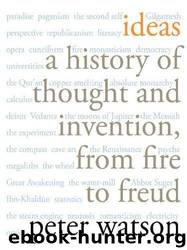Ideas by Watson Peter

Author:Watson, Peter [Watson, Peter]
Language: eng
Format: mobi, epub
Publisher: Harper Perennial
Published: 2009-10-12T16:00:00+00:00
Valerie Flint’s reconstruction of Columbus’ known reading shows that, in addition to Italian, he was adept at Latin, Castilian and Portuguese and that his books–many heavily annotated to the point of defacement–fell into two broad areas. He was, as the remarks at the beginning of this chapter underline, fascinated by Asia, by the exotic people and treasures to be found there, which all reinforced his conviction that he would one day find a new route to the East. The less copious aspect of his reading was given over to how new countries might be governed and administered. This was against a general background that you would expect for an explorer—a grounding in astronomy, arithmetic, geography, geometry, as well as history and philosophy.40 It would appear that Columbus did not read widely, but he did read deeply. There survive five books heavily annotated by the admiral. These include the Imago Mundi of Pierre d’Ailly (1350—1420, bishop of Cambrai, then cardinal) which was printed in the early 1480s and claimed that in parts of the world it was day for six months followed by night for six months.41 Columbus’ copy contains 898 postille, or annotations. A second book, the Historia Rerum Ubique Gestarum, by Aeneas Silvius Piccolomini (Pius II, pope 1458—1464), had 862 annotations, and a third, De Consuetudinibus et Conditionibus Orientalium Regionum, produced by the Dominican friar Pipino of Bologna, in the early fourteenth century, had 366 annotations. A lot of Columbus’ mental horizon can be reconstructed from these annotations. For example, we can observe Columbus as he settles on certain aspects of these books. He is very interested in the treasures they describe, in the effects of climate on human nature—he believes, for instance, that the peoples of the East, where the sun rises over them, are quicker by nature than other peoples, and ‘inclined to high enterprise and to astrology’.42 Columbus is particularly interested in any abnormalities of nature. He believes that extremes of climate may produce deformities in people, in particular cannibalism, an interest which pervades his writings. Among the monstrous and marvellous peoples, he seems to have had an abiding interest in Amazons, societies where the traditional gender and sexual roles are reversed, and where women are the leading lights. 43 He shared the feelings of many people of his age that the wearing of silk led to moral turpitude but he was fascinated by China because he believed it lay opposite Spain, across the Atlantic, with the northern part opposite Ireland.
Of course, he was interested in seafaring too, as may be imagined, and in particular ailments that might be encountered at sea. Remedies for kidney stones consist of a sea scorpion soaked in wine, or water-snakes’ livers, or sea nettles also soaked in wine. Perhaps the most unexpected aspect of Columbus’ reading was Plutarch’s Lives, which was translated fully into Latin only in 1470.44 As well as showing an interest in history, and historical biography, it seems that Columbus was looking for models of government that might be needed if he did indeed find new countries.
Download
This site does not store any files on its server. We only index and link to content provided by other sites. Please contact the content providers to delete copyright contents if any and email us, we'll remove relevant links or contents immediately.
| Civilization & Culture | Expeditions & Discoveries |
| Jewish | Maritime History & Piracy |
| Religious | Slavery & Emancipation |
| Women in History |
Cecilia; Or, Memoirs of an Heiress — Volume 1 by Fanny Burney(31334)
Cecilia; Or, Memoirs of an Heiress — Volume 3 by Fanny Burney(30935)
Cecilia; Or, Memoirs of an Heiress — Volume 2 by Fanny Burney(30890)
The Secret History by Donna Tartt(16628)
Sapiens: A Brief History of Humankind by Yuval Noah Harari(13055)
Leonardo da Vinci by Walter Isaacson(11906)
The Radium Girls by Kate Moore(10909)
Sapiens by Yuval Noah Harari(4539)
The Wind in My Hair by Masih Alinejad(4425)
How Democracies Die by Steven Levitsky & Daniel Ziblatt(4400)
Homo Deus: A Brief History of Tomorrow by Yuval Noah Harari(4281)
Endurance: Shackleton's Incredible Voyage by Alfred Lansing(3845)
The Silk Roads by Peter Frankopan(3762)
Man's Search for Meaning by Viktor Frankl(3636)
Millionaire: The Philanderer, Gambler, and Duelist Who Invented Modern Finance by Janet Gleeson(3570)
The Rape of Nanking by Iris Chang(3517)
Hitler in Los Angeles by Steven J. Ross(3438)
The Motorcycle Diaries by Ernesto Che Guevara(3337)
Joan of Arc by Mary Gordon(3259)
